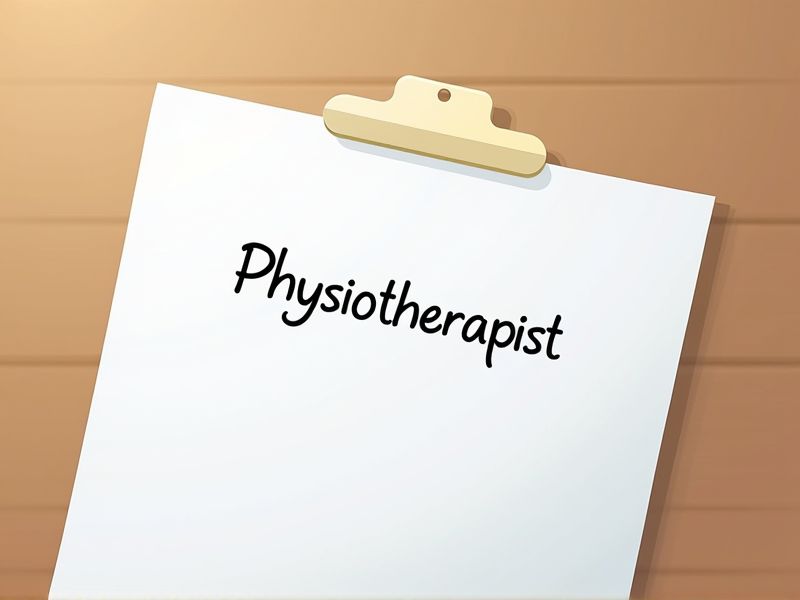
Physiotherapists require certain certifications to ensure they have the essential skills and standardized knowledge to assess and treat patients effectively. Obtaining these certifications often leads to enhanced trust and credibility among patients and healthcare providers. Specializations such as orthopedic or sports physiotherapy often demand additional credentials to demonstrate expertise in those particular areas. Consider these important certifications you might need as a physiotherapist.
State Licensed Physical Therapist Certificate
A State Licensed Physical Therapist Certificate is necessary to ensure that physiotherapists meet specific educational and professional standards. This certification helps protect patients by guaranteeing that therapists possess the required knowledge and skills to provide safe and effective care. By requiring a license, states can enforce regulations and monitor the professional conduct of physiotherapists, reducing the risk of malpractice. The certification also enhances the credibility and reputation of the physiotherapist within the healthcare industry.
Board Certified Specialist in Orthopaedic Physical Therapy (OCS)
For physiotherapists, obtaining Board Certified Specialist in Orthopaedic Physical Therapy (OCS) signifies advanced expertise in musculoskeletal conditions, which enhances their credibility among patients and healthcare peers. Specializing in this field increases their ability to provide effective, evidence-based treatments, reducing recovery times and improving patient outcomes. With the growing complexity of orthopedic cases, specialized knowledge helps physiotherapists address specific needs, giving them a competitive edge in the job market. The OCS credential opens opportunities for leadership roles and teaching, facilitating career progression and personal development.
Board Certified Specialist in Neurologic Physical Therapy (NCS)
A Board Certified Specialist in Neurologic Physical Therapy (NCS) equips physiotherapists with advanced knowledge and skills specifically tailored to complex neurological conditions. This certification enhances clinical expertise, enabling therapists to effectively manage conditions like stroke, traumatic brain injury, and multiple sclerosis. Patients experiencing neurologic disorders often require specialized interventions, and therapists with an NCS credential are better prepared to deliver high-quality care. As a result, achieving NCS certification directly impacts patient outcomes by improving the precision and efficacy of therapeutic strategies.
Certified Manual Therapy Provider (CMTP)
A Certified Manual Therapy Provider (CMTP) enhances a physiotherapist's skill set, allowing them to effectively address musculoskeletal and neuromuscular issues. Manual therapy techniques, backed by certification, can improve patient outcomes through precise assessment and treatment. Patients often seek physiotherapists with specialized qualifications, leading to higher trust and increased clientele for certified practitioners. Obtaining CMTP certification may also broaden career opportunities and potential salary enhancement due to specialized expertise.
Certified Dry Needling Practitioner (CDNP)
Physiotherapists seeking to enhance treatment outcomes often require the specialized skills of a Certified Dry Needling Practitioner (CDNP) to address myofascial pain more effectively. Dry needling can expedite patient recovery by targeting trigger points, which reduces muscle tension and promotes healing. Certification ensures that physiotherapists apply this technique safely and with precision, minimizing the risk of complications. Evidence suggests that integrating dry needling into physiotherapy practice results in improved patient satisfaction and treatment efficacy.
Certified Lymphedema Therapist (CLT)
Lymphedema often results from cancer treatments, surgeries, or genetic conditions, leading to swelling and discomfort. A Certified Lymphedema Therapist (CLT) equips physiotherapists with specialized knowledge to effectively manage and treat this condition, improving patient outcomes. Without CLT training, there's a risk of mismanagement, which can exacerbate symptoms and hinder recovery. Informed care through CLTs can prevent complications such as infection, fibrosis, and decreased mobility.
Certified Sports Physical Therapist (CSPT)
Certified Sports Physical Therapists possess advanced knowledge in managing sports injuries, leading to improved recovery outcomes for athletes. Their expertise in biomechanics and athletic conditioning enables precise injury prevention strategies, reducing recurrence rates. Physiotherapists with CSPT certification can offer tailored rehabilitation programs, fostering quicker return to sports. The certification signifies a commitment to evidence-based practices, enhancing trust and credibility among athletes and sports organizations.
Basic Life Support (BLS) Certification
Basic Life Support (BLS) Certification equips physiotherapists with essential skills to handle life-threatening emergencies such as cardiac arrest or choking during treatment sessions. In high-risk scenarios, having BLS certification increases patient safety by ensuring physiotherapists can provide immediate lifesaving interventions. Accreditation in BLS enhances a physiotherapist's professional credibility and can be a requirement for employment in many healthcare facilities. Knowledge from BLS courses also enables physiotherapists to identify early warning signs of medical emergencies, ensuring timely intervention and potentially preventing further complications.
Advanced Cardiovascular Life Support (ACLS) Certification
ACLS certification for physiotherapists enhances patient safety by equipping them with skills to manage cardiac emergencies. Given that physiotherapists often work with patients who have pre-existing cardiac conditions, such training ensures rapid and appropriate response. It also fosters interdisciplinary collaboration by enabling physiotherapists to actively participate in emergency scenarios alongside other healthcare professionals. The certification improves patient outcomes by reducing response time during critical situations.
Pediatric Advanced Life Support (PALS) Certification
Physiotherapists often work in environments like hospitals and clinics where emergencies involving children can arise, necessitating skills in Pediatric Advanced Life Support (PALS) to effectively respond. The PALS certification equips physiotherapists with the critical ability to recognize and manage emergencies in pediatric patients, enhancing safety and outcomes. By acquiring PALS certification, physiotherapists align with interdisciplinary teams more competently, promoting cohesive and comprehensive patient care. Moreover, having a PALS certification can lead to increased professional opportunities and trust among healthcare colleagues and patients' families.
Summary
When you obtain certifications as a physiotherapist, your professional credibility increases significantly. This certification can lead to better job opportunities and higher salary prospects due to enhanced skills. Employers view you as more qualified, which can result in greater trust and responsibility in patient care. Completing certifications also allows you to specialize in certain areas, broadening your expertise and improving treatment outcomes.
